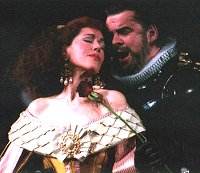Sandra Ford (Elvira) and Alan Opie (Don Carlo). Photographer Bill Rafferty
With his fifth opera, Ernani, Verdi moved away from the high-minded communal concerns of the worlds of Nabucco and I Lombardi to the more concentrated depiction of a passionate individualism; in fact, the roots of the composer's Risorgimento phase are perhaps laid here. Along with that new-found thrust for freedom there is increasing focus on the possibilities of musical characterisation; and, with three men all paying court to one woman, there are the expressive qualities of three voice types: tenor (Ernani), baritone (Don Carlos) and bass (Silva). All three certainly make the most of their voices, too, in a thrilling and high-energy account of the opera coming from ENO.
In the title role, Julian Gavin is a dashing and driven Ernani, with a resplendent tenor register - his voice also has the stamina to maintain the frenzied momentum right up to his grizzly end, and beyond. Usually seen in comic roles, Alan Opie branches into new territory, yet his delivery is no less assured, and he is on appropriately imperious form as King of Spain, Don Carlo. Meanwhile, Peter Rose's rich bass timbres make Silva into no mere gravelly old retainer; instead, he is a smooth-toned operator in more ways than one. The object of affection for the trio of male leads is the Elvira of Sandra Ford, who possesses a glittering and piercing upper register, even if her lower notes occasionally fail to register. Plus, all four principals certainly maintain the ethos of the Coliseum's opera of English policy. Anthony Peattie's translation comes over loud and clear: no surtitles required, thank you very much.
If anything, though, there are a few problems elsewhere in terms of the location of an apt dramatalurgical vehicle for the vocal pyrotechnics. Based on a High Romantic drama by Victor Hugo, Ernani is an unashamed melodrama. Three men chase one girl - Ernani seems to win, but does he? No, a pact of honour he made with the dastardly Silva entails him, rather ludicrously, instead of heading off on honeymoon after his wedding, slitting his wrists. But then this is Renaissance Spain. Or is it? Despite some colourful costumes from Irene Bohan, Mike Ashman doesn't seem able to breathe sufficient new life into reinterpreting Elijah Moshinsky's Welsh National Opera production first mounted way back in 1979. Ashman handles the crowd scenes well enough but there seems little individual psychology or motive in evidence. For all their surface vibrancy, Ernani, Carlo and Silva are cut-outs. Meanwhile, Maria Bjornsen's all-purpose black galleried set hardly conveys the necessary Act III switch of locale to some 1,500 miles north east of Iberia and the vaults enclosing Charlemagne's tomb in Aachen Cathedral - vital in terms of both the historical and 'operatic' contexts; here, Carlo is made Holy Roman Emperor and, following in the footsteps of Titus et al, dispenses forgiveness and clemency.
But if the staging is somewhat lacking in hue, the orchestral tapestry isn't. A brash and brazen approach suits the young Verdi's intentions to a tee and, in the pit, conductor David Parry gives the score some welly. But the ENO orchestra responds magnificently with great swathes of homogenous sound. Add equally sterling work from the chorus for a really gutsy musical performance all around. Nobody will be nodding off in the seat next to you at this opera.
Duncan Hadfield

 Return to:
Return to: